GRADUATE
HERE WE GRADUATE!! WE OFFER BEST TUTORIAL SERVICES
- 236
- 0
- 1
Community
- Followers
- Following
17 Reviews received
237 items
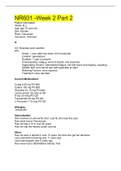
NR601 -Week 2 Part 2 | VERIFIED SOLUTION
NR601 -Week 2 Part 2 Patient Information: Initials: B.J. Age: age 70 year old Sex: Female Race: Caucasian Insurance: Unknown S: CC: Dyspnea upon exertion HPI: Onset: 1 year (after the dead of her husband) Location: generalized Duration: 1 year to present Characteristics: fatigue, short of breath, and insomnia Aggravating Factors: Generalized fatigue, her feet burns and tingling, coughing, swollen feet, and cannot see well especially at night Relieving Factors: none reported ...
- Case
- • 6 pages •
NR601 -Week 2 Part 2 Patient Information: Initials: B.J. Age: age 70 year old Sex: Female Race: Caucasian Insurance: Unknown S: CC: Dyspnea upon exertion HPI: Onset: 1 year (after the dead of her husband) Location: generalized Duration: 1 year to present Characteristics: fatigue, short of breath, and insomnia Aggravating Factors: Generalized fatigue, her feet burns and tingling, coughing, swollen feet, and cannot see well especially at night Relieving Factors: none reported ...
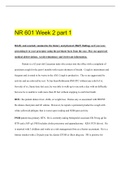
NR 601 Week 2 part 1
NR 601 Week 2 part 1 Briefly and concisely summarize the history and physical (H&P) findings as if you were presenting it to your preceptor using the pertinent facts from the case. May use approved medical abbreviations. Avoid redundancy and irrelevant information. Patient is a 62-year-old Caucasian male who comes into the office with a complaint of persistent cough for the past 6 months with recent shortness of breath. Cough is intermittent and frequent and is noted to be worse in the AM. Co...
- Exam (elaborations)
- • 9 pages •
NR 601 Week 2 part 1 Briefly and concisely summarize the history and physical (H&P) findings as if you were presenting it to your preceptor using the pertinent facts from the case. May use approved medical abbreviations. Avoid redundancy and irrelevant information. Patient is a 62-year-old Caucasian male who comes into the office with a complaint of persistent cough for the past 6 months with recent shortness of breath. Cough is intermittent and frequent and is noted to be worse in the AM. Co...
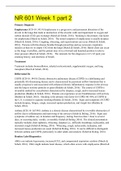
NR 601 Week 1 part 2
NR 601 Week 1 part 2
- Case
- • 4 pages •
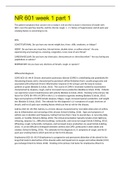
NR 601 week 1 part 1
NR 601 week 1 part 1
- Case
- • 3 pages •
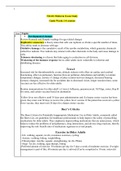
NR 601 Midterm Exam Study Guide Weeks 1-4 content
NR 601 Midterm Exam Study Guide Weeks 1-4 content Week Topics 1 • Developmental changes Review Kennedy and Dunphy readings for age related changes Replicative senescence is theory states that cells can replicate or divide a specific number of times. This ability tends to decrease with age. Oxidative damage is the cumulative result of the aerobic metabolism, which generates chemicals called free radicals. Free radicals may interact with other chemicals in the body and cause damage to ...
- Case
- • 30 pages •
NR 601 Midterm Exam Study Guide Weeks 1-4 content Week Topics 1 • Developmental changes Review Kennedy and Dunphy readings for age related changes Replicative senescence is theory states that cells can replicate or divide a specific number of times. This ability tends to decrease with age. Oxidative damage is the cumulative result of the aerobic metabolism, which generates chemicals called free radicals. Free radicals may interact with other chemicals in the body and cause damage to ...
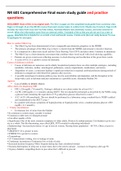
NR 601 Comprehensive Final exam study guide and practice
NR 601 Comprehensive Final exam study guide and practice questions DISCLAIMER- None of this is my original work. The first 11 pages are the completed study guide from a previous class. Pages 11 through 13 are the NR 601 course final exam review topics in outline form (Thanks Lisa Trevino!). Page 13-46 includes my notes from class and YouTube videos, Kennedy-Malone text (minimal), lessons, and some external re-search. When the information came from an external article, I included a link so tha...
- Exam (elaborations)
- • 77 pages •
NR 601 Comprehensive Final exam study guide and practice questions DISCLAIMER- None of this is my original work. The first 11 pages are the completed study guide from a previous class. Pages 11 through 13 are the NR 601 course final exam review topics in outline form (Thanks Lisa Trevino!). Page 13-46 includes my notes from class and YouTube videos, Kennedy-Malone text (minimal), lessons, and some external re-search. When the information came from an external article, I included a link so tha...
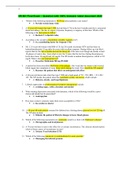
NR 601 Final Exam – Question with 100% Answers latest document 2020
NR 601 Final Exam – Question with 100% Answers latest document 2020 1. ‘Which of the following statements is NOT true about palliative care teams? • A: Provide weekly home visits 2. A 55-year-old women has type 2 DM she had three UTIs in the last 9 months and she is concerned about her kidneys. She has no report of dysuria, frequency or urgency at this time. Which of the following is the best action to follow? • A: Recheck UA dipstick today 3. According to the sexuality presen...
- Exam (elaborations)
- • 7 pages •
NR 601 Final Exam – Question with 100% Answers latest document 2020 1. ‘Which of the following statements is NOT true about palliative care teams? • A: Provide weekly home visits 2. A 55-year-old women has type 2 DM she had three UTIs in the last 9 months and she is concerned about her kidneys. She has no report of dysuria, frequency or urgency at this time. Which of the following is the best action to follow? • A: Recheck UA dipstick today 3. According to the sexuality presen...
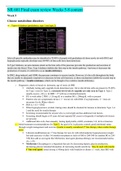
NR 601 Final exam review Weeks 5-8 content
NR 601 Final exam review Weeks 5-8 content Week 5 Glucose metabolism disorders • Types of diabetes (prediabetes, type 1 and type 2) Islet cell-specific antibodies may be identified in 70-80% of people with prediabetes & those newly dx with DM1 and hyperglycemia typically develops once 80-90% of beta cells have been destroyed. In Type I diabetes, an auto-immune attack on the beta cells of the pancreas prevents the production and secretion of insulin into the blood. Thus, Type I d...
- Exam (elaborations)
- • 5 pages •
NR 601 Final exam review Weeks 5-8 content Week 5 Glucose metabolism disorders • Types of diabetes (prediabetes, type 1 and type 2) Islet cell-specific antibodies may be identified in 70-80% of people with prediabetes & those newly dx with DM1 and hyperglycemia typically develops once 80-90% of beta cells have been destroyed. In Type I diabetes, an auto-immune attack on the beta cells of the pancreas prevents the production and secretion of insulin into the blood. Thus, Type I d...
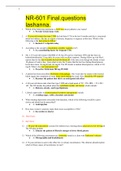
NR-601 Final.questions lashanna.
NR-601 Fions lashanna. 1. Which of the following statements is NOT true about palliative care teams? • A: Provide weekly home visits 2. A 55-year-old women has type 2 DM she had three UTIs in the last 9 months and she is concerned about her kidneys. She has no report of dysuria, frequency or urgency at this time. Which of the following is the best action to follow? • A: Recheck UA dipstick today 3. According to the sexuality presentation, atrophic vaginitis (AV) • A: Is a contrib...
- Exam (elaborations)
- • 7 pages •
NR-601 Fions lashanna. 1. Which of the following statements is NOT true about palliative care teams? • A: Provide weekly home visits 2. A 55-year-old women has type 2 DM she had three UTIs in the last 9 months and she is concerned about her kidneys. She has no report of dysuria, frequency or urgency at this time. Which of the following is the best action to follow? • A: Recheck UA dipstick today 3. According to the sexuality presentation, atrophic vaginitis (AV) • A: Is a contrib...
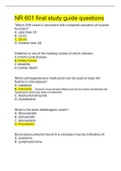
NR 601 final study guide questions | VERIFIED SOLUTION
NR 601 final study guide questions "Which FSH value is consistent with complete cessation of ovarian function?" A. Less than 10 B. 10-25 C. 25-35 D. Greater than 40 Diabetes is one of the leading causes of which disease: A chronic lung disease B kidney failure C disability D cardiac death. Which antihypertensive medication can be used to treat hot flashes in menopause? A. Labatelol B. Clonidine However it has adverse effects such as dry mouth, drowsiness and hypotension whi...
- Exam (elaborations)
- • 16 pages •
NR 601 final study guide questions "Which FSH value is consistent with complete cessation of ovarian function?" A. Less than 10 B. 10-25 C. 25-35 D. Greater than 40 Diabetes is one of the leading causes of which disease: A chronic lung disease B kidney failure C disability D cardiac death. Which antihypertensive medication can be used to treat hot flashes in menopause? A. Labatelol B. Clonidine However it has adverse effects such as dry mouth, drowsiness and hypotension whi...

MATH 225N FINAL EXAM 2 – QUESTION AND ANSWERS
INET HESI RN V1 ACTUAL TEST SCREENSHOTS
INET HESI RN V1 ACTUAL TEST SCREENSHOTS
INET HESI RN V1 ACTUAL TEST SCREENSHOTS
INET HESI RN V1 ACTUAL TEST SCREENSHOTS